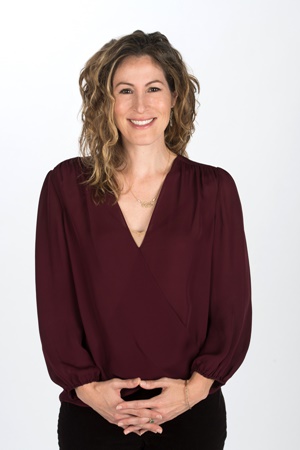As ESPN announcer Jason Benetti prepared to call an Oregon State baseball game in June, news broke that the school’s star pitcher Luke Heimlich had pleaded guilty to sexually abusing a young relative just five years earlier.
Benetti immediately called ESPN’s senior director of communications, Keri Potts, to help him figure out what words he should use when he addressed the situation on-air.
“I don’t know what I would have said, but I do know that it would have been more ham-handed than what I said,” Benetti said.
When the NFL suspended Dallas Cowboys running back Ezekiel Elliott for a domestic violence incident in August, “SportsCenter” anchor Kevin Negandhi recalled a talk Potts gave on the language of sexual assault as he wrote his script for that night’s show.
 |
Keri Potts, ESPN’s senior director of communications
Photo by: ESPN IMAGES |
“I just remember channeling Keri in the back of my mind saying, ‘Don’t be afraid to make sure you explain why we’re going through this,’” Negandhi said.
The story of how an ESPN PR representative becomes such an important voice on how ESPN covers sexual assault and abuse issues is nearly a decade in the making. It’s a story of not giving up when doors get closed, which is something that happened quite a bit over the years.
Where ESPN editorial and talent once dismissed Potts as an advocate, they increasingly have leaned on her to help with the language they should use when they report news of sexual violence and sexual harassment. Announcers regularly call her to discuss how to address sexual assault storylines that arise in a given game. News anchors send countless emails to Potts, checking language on sensitive stories.
These issues are important to Potts, who was sexually assaulted in Italy in 2008. She told her story in a 2010 issue of Marie Claire, after which she started giving talks outside of ESPN about that experience. Potts said she was surprised by how many people were moved by her story.
“I realized that while I was an expert about my own personal story, I wasn’t an expert on the topic, and I felt like I needed to go get training and get certified,” Potts said. “I also didn’t realize how inspiring my talks would be to people. After I would give talks, people I didn’t even know would come to my office and ask if they could speak with me, and then just break down and tell me about a rape that just happened like the week earlier.”
Potts got her certification to work with sexual assault victims and began helping them in her spare time outside of work. It wasn’t until 2011 when she saw attorney Claudia Bayliff give a presentation called “Raped or Seduced” at the CounterQuo conference at Suffolk University that she realized she could effect change where she worked. Bayliff’s talk explored language used in writing about sexual assault crimes, and how some terms — like “accuser” and “claimed” — are prejudicial. Potts saw those terms come up all the time at ESPN.
“As you tend to be when you come out of a conference, I was super ardent,” Potts said. “I reached out to some folks in our news division, particularly about changing the word ‘accuser.’”
Potts’ enthusiasm hit a brick wall. The news group wanted to bend over backward to not appear biased and saw Potts as someone trying to take it to an extreme.
Potts bided her time.
Three years later, Ravens running back Ray Rice assaulted his then-fiancee on an elevator, and Potts renewed her push to change the language ESPN used when reporting those cases. While the news division was more receptive, her pitch again went nowhere.
“It’s hard not to be a little bitter, because it is personal,” she said.
It changed last January when during the Allstate Sugar Bowl, ESPN announcer Brent Musburger defended Oklahoma running back Joe Mixon, who was charged with assaulting a woman. (“Folks, he is just one of the best,” Musburger said.)
A week later she huddled with Stephanie Druley, ESPN’s senior vice president of event and studio production. Druley wanted her announcers and analysts to use more neutral language when talking about these matters and decided to give Potts a platform.
She arranged to have Potts address all of ESPN’s college football talent at the network’s annual meetings in August. This year, the meeting was held in Atlanta, where Potts lives.
“The goal was not trying to change people’s minds about however they felt about things,” Druley said. “It was about making sure they have the right background to put themselves in certain positions to understand what all sides are going through.”
Potts’ talk was a hit, and she left to a standing ovation. Other departments quickly invited Potts to speak to their groups. ESPN’s editorial department even brought Potts in to help develop guidelines for how to write about sexual assault and sexual violence, similar to guidelines for how ESPN writes about the LGBT community.
Under ESPN’s new sexual assault guidelines, people are not called “accusers” or “alleged victims.” Rather, ESPN refers to them as men and women. The guidelines spell out euphemisms to avoid and what Potts calls “consensual language” that shouldn’t be uttered. ESPN tries to not refer to a salacious story as a “sex scandal” and does not call rape a “sex act.”
“We try to be careful with our language,” said David Kraft, ESPN’s executive editor of news operations. “We want to be as honest with our viewers and readers as possible without being seen as being sympathetic to one side or another.”




